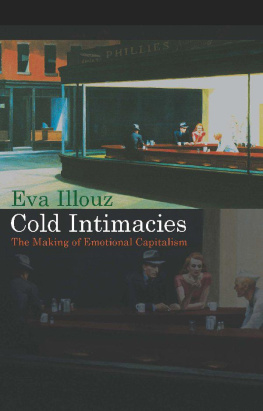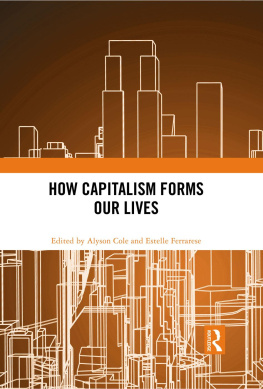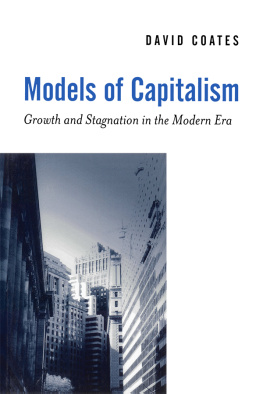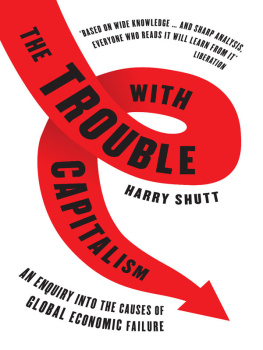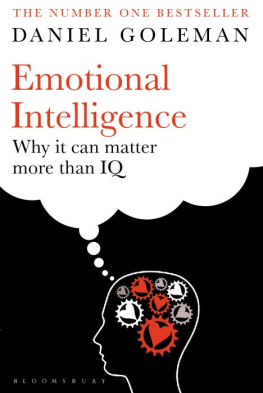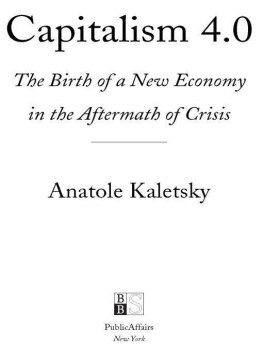Table of Contents
To Elchanan

Copyright Eva Illouz 2007
The right of Eva Illouz to be identified as Author of this Work has been asserted in accordance with the UK Copyright, Designs and Patents Act 1988.
First published in 2007 by Polity Press
Polity Press
65 Bridge Street
Cambridge CB2 1UR, UK.
Polity Press
350 Main Street
Malden, MA 02148, USA
All rights reserved. Except for the quotation of short passages for the purpose of criticism and review, no part of this publication may be reproduced, stored in a retrieval system, or transmitted, in any form or by any means, electronic, mechanical, photocopying, recording or otherwise, without the prior permission of the publisher.
ISBN-10: 0-7456-3904-6
ISBN-13: 978-07456-3904-8
ISBN-10: 0-7456-3905-4 (pb)
ISBN-13: 978-07456-3905-5 (pb)
ISBN-13: 978-07456-5807-0 (Multi-user ebook)
ISBN-13: 978-07456-5808-7 (Single-user ebook)
A catalogue record for this book is available from the British Library.
The publisher has done its best to ensure that the URLs for external websites referred to in this book are correct and active at the time of going to press. However, the publisher has no responsibility for the websites and can make no guarantee that a site will remain live or that the content is or will remain appropriate.
Every effort has been made to trace all copyright holders, but if any has been inadvertently overlooked, the publishers will be pleased to include any necessary credits in any subsequent reprint or edition.
For further information on Polity, visit our website: www.polity.co.uk
Acknowledgments
Few books owe their existence to the initiative of a single person. This book is one of them. When he invited me to deliver the Adorno Lectures in Frankfurt, Axel Honneth compelled me to stop and think again about what I was working on at the time, namely the role of psychology in shaping the ordinary cultural frames of middle-class men and women in much of the contemporary world. I re-read critical theorists, and came to realize with a renewed acuity that the long tradition of critical theory starting, from Theodor Adorno to Axel Honneth via Habermas, has yet to be surpassed in its capacity to make sense of the conflicting tendencies at work in modernity. Axels towering intellectual vision, his generosity and relentless energy stand squarely behind the making of this book.
I thank wholeheartedly Viviana Zelizer for having made possible a visiting position at the department of Sociology at Princeton University during which I wrote these lectures. My deep gratitude goes to the cheerful and efficient librarians of the Institute for Advanced Study.
Beatrice Smedley read all three chapters, and with her exceptional kindness and sharpness offered a lot to reflect about and to improve on. Carol Kidrons own work on trauma as well as her critical insights contributed to the book. Eitan Wilf must be thanked for reading the manuscript and offering, with his usual directness, sharp criticisms and judicious bibliographical additions. Lior Flum has been an invaluable help in the sometimes difficult process of making a book presentable.
I thank wholeheartedly Sarah Dancy, Emma Hutchinson, and Gail Ferguson at Polity Press for their thoroughness, professionalism, and kindness.
Finally, I dedicate this book to my husband and best friend, Elchanan, who did more than his share of reading, criticizing, discussing the book, spent a considerable amount of his time listening to many confused hesitations, and shared in more than a few moments of unthinking happiness.
Eva Illouz
The Rise of Homo Sentimentalis
Sociologists have traditionally conceived of modernity in terms of the advent of capitalism, the rise of democratic political institutions, or the moral force of the idea of individualism, but have taken little notice of the fact that, along with the familiar concepts of surplus value, exploitation, rationalization, disenchantment, or division of labor, most grand sociological accounts of modernity contained, in a minor key, another story: namely descriptions or accounts of the advent of modernity in terms of emotions. To take a few glaring yet seemingly trivial examples, Webers Protestant ethic contains at its core a thesis about the role of emotions in economic action, for it is the anxiety provoked by an inscrutable divinity which is at the heart of the capitalist entrepreneurs frantic activity.
My point is clear enough, and I do not need to belabor it: unbeknown to them, canonical sociological accounts of modernity contain, if not a full-fledged theory of emotions, at least numerous references to them: anxiety, love, competitiveness, indifference, guilt are all present in most historical and sociological accounts of the ruptures which have led to the modern era, if we only care to scratch its surface. My broad claim in this book is that when we recover that not-so-hidden dimension of modernity, standard analyses of what constitutes modern selfhood and identity, of the privatepublic divide and its articulation on gender divisions, become seriously altered.
But, you may ask, why should we do that? Wouldnt focusing on such a highly subjective, invisible, and personal experience as emotion undercut the vocation of sociology, which has been, after all, chiefly concerned with objective regularities, patterned action, and large-scale institutions? Why, in other words, should we fuss and mess with a category without which sociology has done, thus far, quite well? There are, I think, quite a few reasons.
Emotion is not action per se, but it is the inner energy that propels us toward an act, what gives a particular mood or coloration to an act. Emotion can thus be defined as the energy-laden side of action, where that energy is understood to simultaneously implicate cognition, affect, evaluation, motivation, and the body. Far from being pre-social or pre-cultural, emotions are cultural meanings and social relationships that are inseparably compressed together and it is this compression which confers on them their capacity to energize action. What makes emotion carry this energy is the fact that it always concerns the self and the relationship of the self to culturally situated others. When you tell me you are late again, whether I feel shame, anger, or guilt will depend almost exclusively on my relationship to you. My bosss remark about my being late is likely to shame me, a colleagues is likely to make me angry, but if it is my child waiting for me at school, it is likely to make me feel guilty. Emotion is certainly a psychological entity, but it is no less and perhaps more so a cultural and social one: through emotion we enact cultural definitions of personhood as they are expressed in concrete and immediate but always culturally and socially defined relationships. I would thus say that emotions are cultural meanings and social relationships that are very compressed together and that it is this compact compression which confers on them their energetic and hence their pre-reflexive, often semi-conscious character. Emotions are deeply internalized and unreflexive aspects of action, but not because they do not contain enough culture and society in them, but rather because they have too much.
For this reason, a hermeneutic sociology which wants to understand social action from within cannot do that adequately without paying attention to the emotional coloration of action and to what actually propels it.
Emotions have another cardinal importance for sociology: much of social arrangements are also emotional arrangements. It is trivial to say that the most fundamental division and distinction organizing most societies around the world that between men and women is based on (and reproduces itself through) emotional cultures. To be a man of character requires one to display courage, cool-headed rationality, and disciplined aggressiveness. Femininity on the other hand demands kindness, compassion, and cheerfulness. The social hierarchy produced by gender divisions contains implicit emotional divisions, without which men and women would not reproduce their roles and identities. And these divisions in turn produce emotional hierarchies, whereby cool-headed rationality is usually deemed more reliable, objective, and professional than, say, compassion. For example, the ideal of objectivity which dominates our conception of the news or of (blind) justice, presupposes such male practice and model of emotional self-control. Emotions are thus organized hierarchically and this type of emotional hierarchy in turn implicitly organizes moral and social arrangements.
Next page
